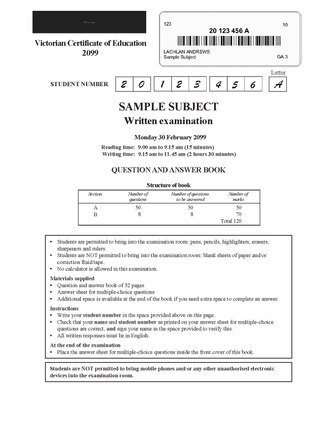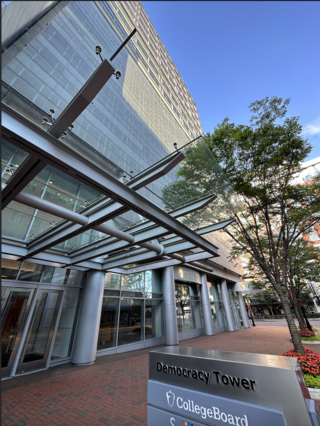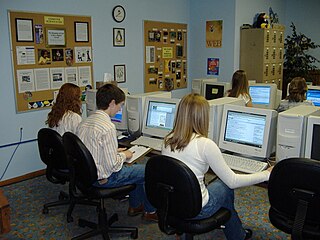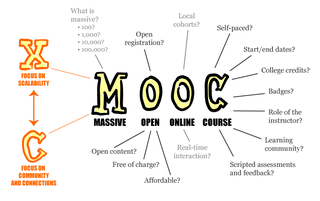
The Victorian Certificate of Education (VCE) is one credential available to secondary school students who successfully complete year 11 and 12 in the Australian state of Victoria as well as in some international schools in China, Malaysia, Philippines, Timor-Leste, and Vietnam.

The College Board, styled as CollegeBoard, is an American not-for-profit organization that was formed in December 1899 as the College Entrance Examination Board (CEEB) to expand access to higher education. While the College Board is not an association of colleges, it runs a membership association of institutions, including over 6,000 schools, colleges, universities, and other educational organizations.

Haileybury is an Australian private school with campuses in Keysborough, Brighton East, Berwick, Darwin, Northern Territory and Melbourne's CBD. It also has an international campus in the Tianjin outer district of Wuqing, China. Haileybury operates under the model of parallel education, which consists of Haileybury College and Haileybury Girls College. Haileybury has been described as the largest independent school in Australia.
Electronic assessment, also known as digital assessment, e-assessment, online assessment or computer-based assessment, is the use of information technology in assessment such as educational assessment, health assessment, psychiatric assessment, and psychological assessment. This covers a wide range of activities ranging from the use of a word processor for assignments to on-screen testing. Specific types of e-assessment include multiple choice, online/electronic submission, computerized adaptive testing such as the Frankfurt Adaptive Concentration Test, and computerized classification testing.

Open educational resources (OER) are teaching, learning, and research materials intentionally created and licensed to be free for the end user to own, share, and in most cases, modify. The term "OER" describes publicly accessible materials and resources for any user to use, re-mix, improve, and redistribute under some licenses. These are designed to reduce accessibility barriers by implementing best practices in teaching and to be adapted for local unique contexts.
Educational technology is the combined use of computer hardware, software, and educational theory and practice to facilitate learning. When referred to with its abbreviation, "EdTech," it often refers to the industry of companies that create educational technology. In EdTech Inc.: Selling, Automating and Globalizing Higher Education in the Digital Age, Tanner Mirrlees and Shahid Alvi (2019) argue "EdTech is no exception to industry ownership and market rules" and "define the EdTech industries as all the privately owned companies currently involved in the financing, production and distribution of commercial hardware, software, cultural goods, services and platforms for the educational market with the goal of turning a profit. Many of these companies are US-based and rapidly expanding into educational markets across North America, and increasingly growing all over the world."

The American Educational Research Association is a professional organization representing education researchers in the United States and around the world. AERA's mission is to advance knowledge about education and promote the use of research in educational practice.
Podcasting refers to the creation and regular distribution of podcasts through the Internet. Podcasts, which can include audio, video, PDF, and ePub files, are subscribed to and downloaded through web syndication or streamed online to a computer or mobile device. Subscribers are then able to view, listen to, and transfer the episodes to a variety of media players, or podcatchers. Though similar to radio, there is no larger regulatory group or oversight with podcasts. Instead, podcasts simply consist of the creators and their listeners. As the technology gained popularity in the early 2000s, the uses of podcasting grew from simply the delivery of content to also creative and responsive purposes.

Ringwood Secondary College is a co-educational public secondary school located in the eastern suburb of Ringwood in Melbourne, Victoria, Australia.
Korowa Anglican Girls' School is a private, Anglican, day school for girls, located in Glen Iris, a suburb of Melbourne, Victoria, Australia.

Melbourne Girls' College is a semi-selective government-funded girls’ school located in Richmond, an inner-city suburb of Melbourne. The school has one campus on the banks of the Yarra River which caters for the secondary education of girls from years 7 to 12, and has an enrolment of 1406, with a division between the middle and senior school. Currently, girls from 212 Melbourne postcodes, in Melbourne and country Victoria, along with girls from overseas countries, make up the student population. Sixty countries of birth are represented at the school.
OpenCourseWare (OCW) are course lessons created at universities and published for free via the Internet. OCW projects first appeared in the late 1990s, and after gaining traction in Europe and then the United States have become a worldwide means of delivering educational content.
Bored of Studies is an Australian website targeted at students in New South Wales and Victoria. It is prominent among students for its Student Assessment Modeller that calculates approximate Australian Tertiary Admission Rank or Equivalent National Tertiary Entrance Rank results, and for hosting study notes for the New South Wales Higher School Certificate courses. An extensive student community has evolved around its forum, which is frequented by school students, teachers and a growing number of university students. The site's name is a parody of the NSW Board of Studies, the former governing organisation for the Higher School Certificate (HSC).

Pacifica Graduate Institute is a private for-profit graduate school with two campuses near Santa Barbara, California. The institute offers masters and doctoral degrees in the fields of clinical psychology, counseling, mythological studies, depth psychology, and the humanities. The institute is accredited by the WASC Senior College and University Commission.

Education in Victoria, Australia is supervised by the Department of Education and Training (DET), which is part of the State Government and whose role is to "provide policy and planning advice for the delivery of education". It acts as advisor to two state ministers, that for Education and for Children and Early Childhood Development.

Computers in the classroom include any digital technology used to enhance, supplement, or replace a traditional educational curriculum with computer science education. As computers have become more accessible, inexpensive, and powerful, the demand for this technology has increased, leading to more frequent use of computer resources within classes, and a decrease in the student-to-computer ratio within schools.

Suzanne Cory High School is a government-funded mixed-sex academically selective secondary day school located in Werribee, in the western region of Melbourne, Australia. The school caters for students from Year 9 to Year 12. Enrolment is offered to those having reached a high aptitude in the annual selective entry high schools entrance examination run by the Department of Education and Early Childhood Development.

A massive open online course or an open online course is an online course aimed at unlimited participation and open access via the Web. In addition to traditional course materials, such as filmed lectures, readings, and problem sets, many MOOCs provide interactive courses with user forums or social media discussions to support community interactions among students, professors, and teaching assistants (TAs), as well as immediate feedback to quick quizzes and assignments. MOOCs are a widely researched development in distance education, first introduced in 2008, that emerged as a popular mode of learning in 2012, a year called the "Year of the MOOC".
A virtual learning environment (VLE) in educational technology is a web-based platform for the digital aspects of courses of study, usually within educational institutions. They present resources, activities, and interactions within a course structure and provide for the different stages of assessment. VLEs also usually report on participation and have some level of integration with other institutional systems. In North America, VLEs are often referred to as Learning Management Systems (LMS).

Digital Media in education is measured by a person's ability to access, analyze, evaluate, and produce media content and communication in a variety of forms. These media may involve incorporating multiple digital softwares, devices, and platforms as a tool for learning. The use of digital media in education is growing rapidly in today's age, competing with books for the leading form of communication. This form of education is slowly combating the traditional forms of education that have been around for a long time. With the introduction of virtual education, there has been a need for more incorporation of new digital platforms in online classrooms.












